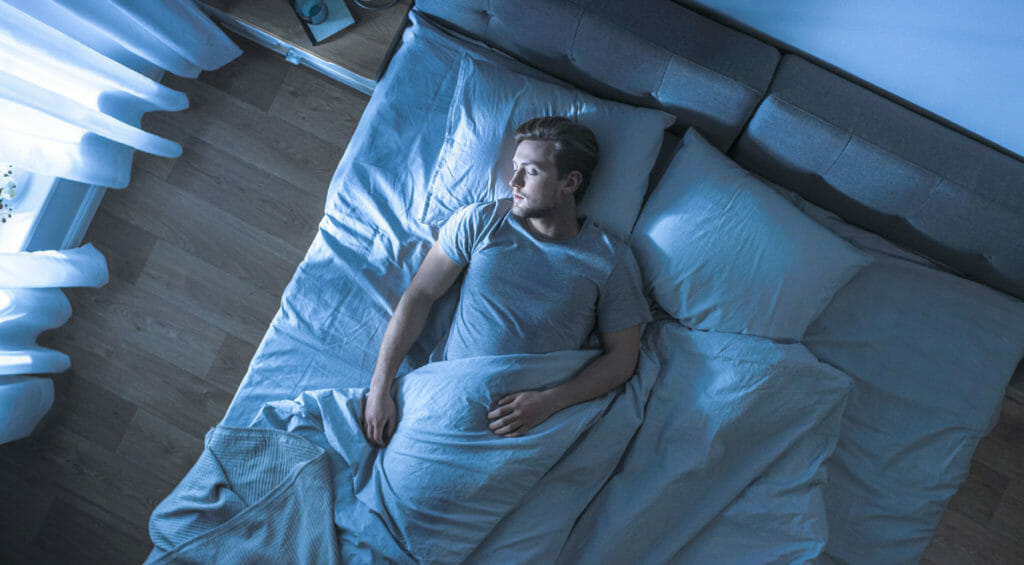Are you sure you’re getting enough REM sleep? More to the point, do you know what REM sleep is? And that not getting enough is detrimental in many ways? No matter what you think you know, keep reading to find out more.
REM stands for rapid eye movement, but a great deal happens during REM sleep other than your eyes moving back and forth. To fully understand REM sleep, it’s useful to understand the entire sleep cycle.

The Sleep Cycle
A normal sleep cycle lasts about 90 minutes, and adults should experience four to five cycles each night. Each sleep cycle includes both REM sleep and non-REM sleep, with REM sleep coming at the end of each cycle. Pain, stress, and whether or not you sleep on a good, quality mattress can all affect your sleep cycle.
Types of Sleep
As previously mentioned, there are two types of sleep: REM sleep and non-REM sleep. Non-REM sleep is divided into three stages: stage 1 (non-REM1, aka N1) or light sleep; stage 2 (N2) or moderate sleep; and stage 3 (N3) or deep sleep or slow-wave sleep. Let’s take a closer look at each type of sleep, what happens during them, and why they’re important.
What Is REM Sleep?

REM sleep occurs at the end of each 90-minute sleep cycle. If you watch a person closely during REM sleep, you will see their eyes moving back and forth beneath their lids. These movements correspond with people visualizing imagery in their sleep. In other words, they’re dreaming.
REM sleep lasts for about ten minutes in the first sleep cycle and gets progressively longer in subsequent cycles. During the final sleep cycle it can last for up to one hour. In healthy adults, REM sleep makes up approximately 25% of the entire night’s sleep.
During REM sleep, your leg and arm muscles are effectively paralyzed, which is believed to be the body’s mechanism for preventing you from acting out your dreams. The brain is very active in this state; an EEG that’s conducted during REM sleep will show brain waves similar to those that appear when you’re awake. Breathing is fast and irregular, and heart rate and blood pressure increase. The brain’s oxygen consumption also increases.
A number of sleep disorders are also associated with REM sleep. They include nightmares and REM sleep behavior disorder (where people act out their dreams).
What Is Non-REM Sleep?
N1 is the transitional stage between wakefulness and sleep. It lasts from one to seven minutes, and it is very easy to wake from this stage. During N1, blood pressure begins to fall, breathing becomes shallow, and heart rate becomes regular.
N2 lasts between 10 and 25 minutes. As this sleep stage progresses, body temperature drops and there is a gradual appearance of slow-wave brain activity. Blood pressure continues to fall, brain metabolism and gastrointestinal secretions decrease, and heart rate slows down. Throughout the night, this stage makes up approximately 50% of our sleep time. It is still easy to wake up from this stage.
N3 is considered the deepest sleep and consists of slow delta waves. Breathing and heart rate continue to slow down, muscles become more relaxed, blood pressure falls, and body temperature reduces further. Sensitivity to light and sound decreases. During N3, it is difficult to wake up. If you do wake up during this stage, you will most likely be groggy or disoriented.
Typically, people get between 20 and 40 minutes of N3 sleep per cycle. However, N3 decreases with each subsequent cycle and occurs mostly in the first third of the night. N3 accounts for at least 20% of a person’s sleep for the night.
N3 sleep is associated with body repair and rejuvenation—tissues, bones, and muscles grow or are repaired, and the immune system strengthens.
What Is REM Sleep’s Connection to Health?

REM sleep affects both your physical and mental health in many ways. Let’s look a bit more at what REM sleep is and how getting enough contributes to a healthy lifestyle—and how the lack of it can be detrimental.
REM Sleep Aids Memory Consolidation
Most interestingly, REM sleep plays a role in memory consolidation. Early research looked at REM sleep and declarative memory (the memory of facts and events that can be consciously recalled, or declared).
For example, when participants undertook an intensive language course, it was noted that REM sleep increased. The assumption, then, was that REM sleep aided the consolidation of the learned material. Subsequent studies confirmed this finding, but scientists have recently learned that slow-wave sleep (N3) also plays a role in long-term memory formation.
REM Sleep Strengthens Coping Skills
REM sleep also strengthens a person’s ability to cope with the stressors of both daily life and traumatic events. An assessment of individuals who experienced a traumatic event and who had long bouts of REM sleep showed that they did not go on to develop post traumatic stress disorder—but those who had short episodes of REM sleep did.
In another study, which used animals that were deprived of REM sleep, the results showed that their coping and defensive responses were impaired during threatening situations.
Consequences of Reduced REM Sleep
As the majority of REM sleep occurs in the latter part of the night, sleep deprivation often encroaches most on REM sleep. Sleep deprivation can have a variety of causes, including sleep disorders (such as sleep apnea, for which some people have found some relief by using a supportive pillow). Alcohol also interferes with REM sleep.
Lack of REM sleep has been linked to:
- Migraines and increased chronic pain
- Obesity (A study published in the International Journal of Obesity found a link between reduced REM sleep and overweight children.)
- Impaired coping skills
- Impaired memory
- Increased depression
- Higher likelihood of anxiety or emotional distress (Emotional memories such as stress and anxiety are processed and resolved during REM sleep.)
Conclusion
So the simple answer to the question of “What is REM Sleep?” is: It’s important! Getting enough REM sleep is vital to your physical, mental, and emotional health. During this time, so much more happens than simple dreaming. Memories are consolidated and strengthened, coping skills are enhanced, stress and feelings of anxiety are dealt with in a healthy way, and stressors that contribute to chronic pain are relieved.
REM sleep is a very important part of our sleep cycle, and there are ramifications if we don’t get enough.